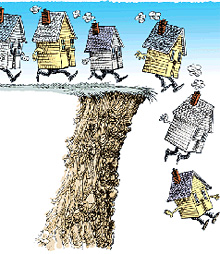
|  |  |  Editorials | Opinions | October 2008 Editorials | Opinions | October 2008  
House Prices Continue to Decline as Talk of Credit Crisis Spins Out of Control
 Dean Baker - The Center for Economic and Policy Research Dean Baker - The Center for Economic and Policy Research
go to original


| | (Cagle/MSNBC) | | |
The root cause of the crisis is the deflating housing bubble; credit problems are secondary.

The Case-Shiller 20-city index fell by another 0.9 percent in July. It has fallen at an 8.6 percent annual rate over the last three months and is down by 16.3 percent from its year ago level. Nominal prices have now declined 19.5 percent from their peak two years ago, which implies a real decline of approximately 27 percent. This means that the bubble is approximately 60 percent deflated. This corresponds to a loss of more than $5 trillion in real housing wealth.

The near hysterical discussion (count the times "Great Depression" appears in news stories) of the bailout still largely fails to recognize the roots of the economy's current problems in the collapse of the housing bubble. Much of the discussion assumes that the problem is just bad subprime loans and that house prices will bounce back once the credit markets are working properly.

Most of the loans that will go bad will not be subprime, since price declines have hit all segments of the housing market. Furthermore, there is no reason to think that house prices will rise from current levels, just as there was no reason to think that the NASDAQ would return to 5000 after the crash. The focus of serious policy should be to prevent overshooting on the downside, where house prices fall below their trend levels.

Prices are continuing to decline at an extraordinary rate in some of the former bubble markets. House prices in Los Angeles fell by 1.6 percent last month. Prices for homes in the bottom third fell by 3.2 percent. Since their peak two years ago, house prices in LA have dropped by 29.7 percent, while prices for the cheapest third of homes have fallen 40.1 percent. Even prices in the top tier are down by 20.4 percent.

In Las Vegas, prices fell by another 2.8 percent in July, with prices in the bottom tier dropping 3.8 percent. In Washington, DC, prices fell by 1.1 percent, while prices in the bottom tier dropped 3.8 percent. In San Francisco the overall decline was 1.8 percent, while prices in the bottom tier fell 3.1 percent.

Since the peak two years ago, nominal prices have fallen by 21.8 percent in Washington, DC, 27.9 percent in San Francisco, and 34.2 percent in Las Vegas. Prices in the bottom tier have fallen by 30.2 percent in Washington, DC, 46.1 percent in San Francisco, and 36.5 percent in Las Vegas.

Many analysts have attributed a tightening of credit in many of these markets to a credit crunch. This is mistaken. While some banks are squeezed because of bad mortgage loans, even a flush bank would impose tighter lending standards in a market with declining house prices. It is reasonable to expect that house prices will be 15 to 25 percent lower at the end of 2009 in many of these deflating markets.

It would be foolish to issue a mortgage loan without a very substantial down payment, since the expected decline in house prices will quickly destroy much or all of the equity held by the homeowner. In other words, it is the drop in house prices that is causing banks to demand 20 percent down payments in many markets, not their lack of capital. This situation will only be changed by a government house-price support program. Improving the financial conditions of banks will make little difference.

Virtually all of the key people in policy positions completely missed the housing bubble as it inflated. As a result, they failed to take corrective steps that would have prevented house prices from getting so far out of line and also would have prevented the disastrous over-extension of credit. The fact that they still seem to not recognize the nature of the housing bubble is likely to further compound their mistakes. The economy is sinking into recession primarily because of the loss of trillions of dollars of housing bubble wealth; the credit situation is very much a secondary factor. |

 |
|  |



